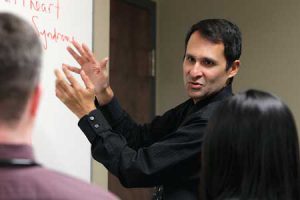
By Allison Flynn
As part of its ongoing mandate to foster diversity in the classroom while addressing some of the most important issues facing our health care system, the Faculty of Medicine has recently introduced a new pathway for international medical graduates (IMGs).
Beginning this fall, IMGs who are Quebec residents can apply for advanced standing into McGill’s MDCM (Doctor of Medicine and Master of Surgery) program. This means that IMGs accepted into the new pathway will begin their studies just before the Introduction to Clinical Medicine component – something that normally begins in the second year for students following the regular curriculum.
“This new initiative builds on our goal to shape a health care system that reflects the populations we serve,” said Saleem Razack, Assistant Dean of the Faculty’s Office of Admissions, Equity and Diversity. “It goes hand in hand with our commitment to diversity and excellence. This means looking at exceptional candidates from all walks of life and backgrounds.”
“Opening up opportunities like these not only supports our diversity objectives, it also enriches the cohort of candidates that applies to the Faculty each year,” said Richard I. Levin, Vice-Principal of Health Affairs and Dean of Medicine. “Moreover, it helps us address pressing health care issues, for example, the current doctor shortages.”
This new IMG pathway is only the latest initiative in a series that seeks to increase the diversity of incoming classes. It follows last year’s launch of the “Non-Traditional” pathway for those interested in practicing medicine but who may have interrupted their studies to join the workforce or raise a family, or who initially chose another career path. Last year also saw the removal of the MCAT exam requirement for Quebec residents – a move that sought to level the playing field for francophone applicants.
Since its inception in 2010, The Office of Admissions, Equity and Diversity has also played a critical role, along with groups of medical students, in a number of community outreach programs that expose teens from rural and Aboriginal communities – those most troubled by a shortage of health care professionals – to the health sciences with the hope that they will think about careers in medicine.
The efforts appear to paying off.
Razack said that in 2011 the MDCM program saw a spike in applications – up to 2,539 applicants from 1,688 the year before. “The talent pool has increased. The students who are applying are more competitive and diverse than ever.”
For more information on the Faculty of Medicine’s Office of Admissions, Equity and Diversity, please visit www.mcgill.ca/medadmissions/equity-diversity/excellence
